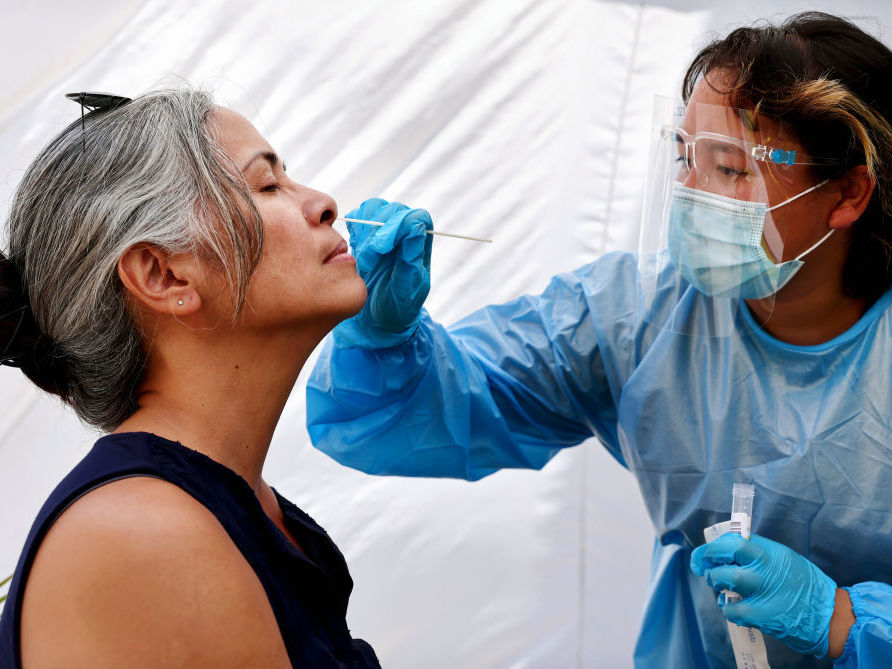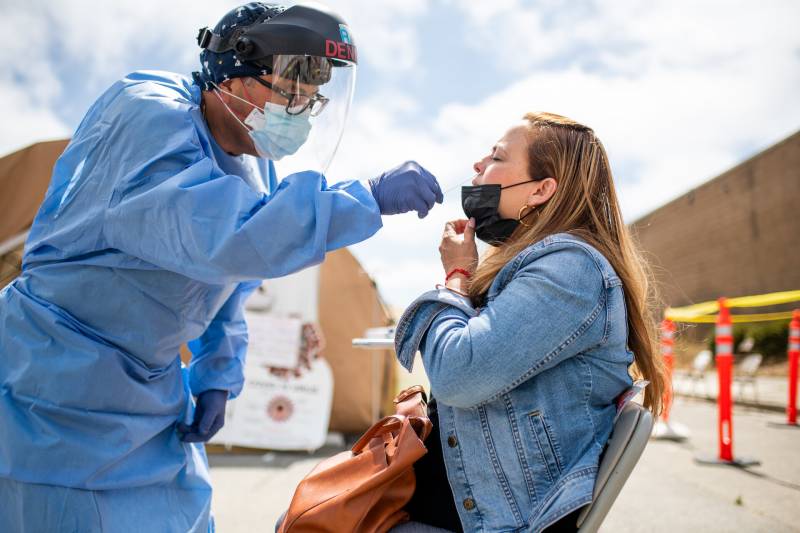Skip to:
- Where to find a free COVID test in your county.
- How soon after possible COVID exposure to get a test.
- Why you might want a COVID test even if you have no symptoms.
More than 60% of Californians are fully vaccinated.
But the spread of the delta variant in the Bay Area and a recent jump in new cases across the state, including infections in vaccinated people, serve as a reminder that the pandemic is still not over — and that COVID testing is still crucial.
Some counties, like San Francisco, have already reopened their testing sites to meet a growing demand. And health experts stress that getting tested for COVID-19, even after you’re fully vaccinated, is an effective way to stop the spread of coronavirus faster.
Why getting tested for COVID is still important — even if you’re vaccinated
"As a vaccinated person,” said Dr. Peter Chin-Hong, professor of medicine and an infectious disease specialist at UCSF, "you are very unlikely to go to the hospital, get in a breathing tube and die.”
"What I can tell you is you potentially could transmit it to others," he said.
Breakthrough cases, or instances when a fully vaccinated person contracts COVID-19, are still very rare, Chin-Hong explained. But knowing with certainty that you are not infected can make a huge difference for those who are much more vulnerable to the coronavirus, like children under 12, who are not yet eligible for a vaccine, or the immunocompromised.
"Knowledge is power,” he said. “Not knowing you have [COVID-19] is much worse than knowing you have it."
If you get tested and receive a positive result, you can then let those with whom you’ve been in close contact know so they can also get tested and take preventive measures. "You may break the chain of transmission," Chin-Hong said.
The COVID symptoms to watch out for right now
You may also consider getting tested even if you haven’t been in close contact with someone who has contracted the virus. Health officials recommend you keep an eye out for symptoms like headaches, fever and a sore throat. Sneezing also is now being seen among some fully vaccinated folks as a COVID-19 symptom.
"Sneezing hadn’t been seen before until delta, among vaccinated folks," Chin-Hong explained. He points out that sneezing could be mistaken for allergies or a mild cold and that would dissuade folks from getting tested. But it’s best to be completely sure of your own status, he said.
Fully vaccinated people may avoid the worst symptoms thanks to the vaccine, "but in the meantime, you probably are exposing a lot of other people to COVID-19 unknowingly," he said.

How soon after possible COVID exposure to get a test
The Centers for Disease Control and Prevention say that if you’re fully vaccinated and get a known exposure to someone with confirmed or suspected COVID, you should get tested three to five days after exposure. The CDC also recommends you wear a mask in public indoor settings for 14 days or until you receive a negative test result.
People who are not fully vaccinated should be tested immediately after being identified and, if negative, tested again in five to seven days after the last exposure or immediately if symptoms develop during quarantine, says the CDC.
Chin-Hong said that the timing of your exposure definitely matters for whether you get a test, and when. If you’ve been in close contact with someone with a COVID diagnosis (that means you were together, unmasked, for more than 15 minutes and less than six feet apart), "we usually start thinking of exposure as around two days before the diagnosis of the friend," said Chin-Hong.
"For example, if somebody went to a party with somebody five days ago, but then didn't hang out with that person since five days ago, but that person got diagnosed two days ago, they wouldn't need to worry about it," Chin-Hong said.
No symptoms or known exposure? Reasons you still might want to find a COVID test
You'll be visiting vulnerable or unvaccinated people.
Dr. Yvonne Maldonado, professor of pediatrics and of epidemiology and chief of the Division of Pediatric Infectious Diseases at the Stanford University School of Medicine, said that the COVID-19 delta variant produces a viral load that is much higher than other variants.
Even though the infection rate among vaccinated people is low, vaccinated people who are infected with the delta variant still carry the same amount of the virus in their nose and throat compared to people who are unvaccinated and infected with the delta variant. What this means is that those who are vaccinated “don’t tend to be as sick as the unvaccinated,” explains Maldonado. “But they could potentially spread [COVID] more.”
You have unvaccinated schoolkids in your home.
During the first week of school, 58 students and 10 staff members tested positive in Oakland Unified School District schools. The tallies are much higher in other parts of the country.
All this means that if you have children under 12 in your home, who aren’t eligible yet for COVID vaccination, you might want to regularly test them yourself to ensure they’re not bringing COVID home from school — or that you’re bringing COVID into the home and infecting them. Read more on keeping children safe from the delta variant.
You'll be traveling to a country that demands a test.
Many countries are requiring entrants to present a negative COVID test taken within a certain time frame of departure (often 72 hours, or three calendar days). Many airlines will ask for proof of this test before you’re allowed to board a flight.
Where to find a COVID test in the Bay Area
If you're looking for COVID-19 testing in the Bay Area, you have several options — and for many testing sites you don’t need health insurance.
Unless otherwise noted, the testing sites use nasal or oral swabs to determine whether you have the virus — not an antibody (serology) blood-based test to determine whether you've been exposed.
Most sites require appointments, and test results should be available within three days. Some sites only offer tests to patients who have at least one symptom or have been exposed to the virus, although most now offer them to all frontline or essential workers, regardless of symptoms or exposure.
Find a COVID test in your Bay Area county
For a complete list of COVID test providers throughout California, use the state's map that says it shows all public and private COVID testing providers.

